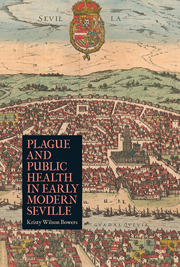Book contents
- Frontmatter
- Dedication
- Contents
- Acknowledgments
- Introduction
- 1 Early Modern Seville: Balancing Growth and Governance
- 2 Perceptions of Plague: Balancing Disease Concepts
- 3 Negotiating Public Health: Balancing the Individual and the Community
- 4 The Wider Politics of Public Health: Balancing Urban and Rural
- 5 City and Crown: Balancing Authorities
- Conclusion
- Notes
- Bibliography
- Index
1 - Early Modern Seville: Balancing Growth and Governance
Published online by Cambridge University Press: 05 October 2013
- Frontmatter
- Dedication
- Contents
- Acknowledgments
- Introduction
- 1 Early Modern Seville: Balancing Growth and Governance
- 2 Perceptions of Plague: Balancing Disease Concepts
- 3 Negotiating Public Health: Balancing the Individual and the Community
- 4 The Wider Politics of Public Health: Balancing Urban and Rural
- 5 City and Crown: Balancing Authorities
- Conclusion
- Notes
- Bibliography
- Index
Summary
An Expanding City
The sixteenth century was a golden age not only for Spain as a country, but more particularly for the city of Seville. Spain rose to great power in this century, and Seville played a crucial role in that expansion. As Spain expanded her presence in the Americas, establishing colonies and exploiting resources, an increasing bureaucracy was necessary to oversee it all. In 1503 the crown established the Casa de la Contratación to help manage the emerging shipping and trade with the Americas, as well as to train the ships' pilots who navigated the route and to maintain useful up-to-date scientific and navigational information for this enterprise. The decision to locate this board in Seville, making it the only port through which all ships and their passengers had to depart and return, assured the city's preeminence in Spain and fame throughout Europe. Prior to 1560, Spanish monarchs held no permanent seat of governance, preferring to rotate their court throughout the realm. The mobility of the royal court dated to the marriage of Fernando and Isabel in 1474, which established a joint rule over their respective realms of Aragon and Castile, but did not formally meld the two into one. Instead, the Catholic monarchs treated each territory separately and therefore shifted their court periodically around their realms to oversee governance and ensure their control. It was their great-grandson, Philip II, who chose the small town of Madrid, centrally located but without any previous history of importance that would compete with his vision of power, as a permanent center of government.
- Type
- Chapter
- Information
- Plague and Public Health in Early Modern Seville , pp. 15 - 29Publisher: Boydell & BrewerPrint publication year: 2013



